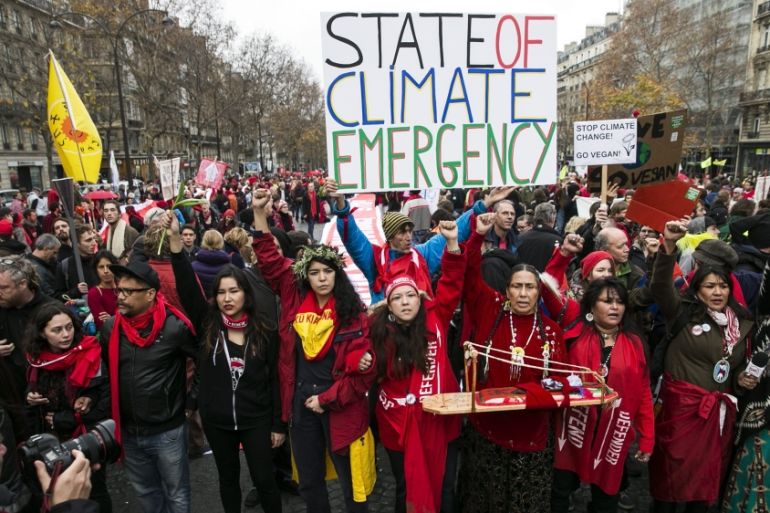Will world leaders adopt historic climate change deal?
Proposed 195-nation draft accord to curb emissions of heat-trapping gases submitted at COP21 conference in Paris.

France has submitted a draft deal to delegates at the UN climate change conference (COP 21) in Paris aimed at curbing emissions to defeat global warming.
Describing it as “a historic accord”, French Foreign Minister Laurent Fabius said on Saturday that the agreement would aim to limit warming of the planet since the Industrial Revolution to “well” below 2.0 degrees Celsius and strive for an even more ambitious goal of 1.5C.
Keep reading
list of 4 itemsLost Futures
Photos: Greek valley that became a lake stirs drought debate
Botswana threatens to send 20,000 elephants to Germany
| Key points |
|
“Our responsibility to history is immense,” Fabius told thousands of officials, including President Francois Hollande and US Secretary of State John Kerry, in the main hall of the conference venue on the outskirts of French capital.
“It is my conviction that we have come up with an ambitious… agreement,” Fabius said, telling the ministers they would achieve a “historic turning point” for the world if they endorsed it.
The draft agreement, that aims to transform the world’s fossil fuel-driven economy within decades and turn the tide on global warming, comes after negotiators missed an initial deadline of Friday, as feuding ministers refused to budge on entrenched positions.
It now needs to be approved by delegates from 195 nations nations participating in the conference in the French capital.
In a sign of growing consensus, AFP news agency reported that the bloc of 134 developing nations are ‘happy’ with climate pact.
Duncan Marsh of The Nature Conservancy, an environment body, told Al Jazeera that “it is a matter of finding the language. I just looked at the text, they have rephrased the language a little bit”.
“And I think it looks like it may be acceptable to all while carrying the same meaning of moving towards de-carbonisation or emissions neutrality.
“Some key issues on finance, differentiation and transparency, that’s what’s remaining right now,” he said.

With 2015 forecast to be the hottest year on record, world leaders and scientists have warned the accord is vital for capping rising temperatures and averting the most catastrophic consequences of climate change.
If climate change goes unabated, scientists warn of increasingly severe droughts, floods and storms, as well as rising seas that would engulf islands and coastal areas populated by hundreds of millions of people.
Activists and concerned citizens have demonstrated near the Eiffel Tower, calling for an end to the use of fossil fuels like oil, gas and coal. They have criticised the accord for favouring rich countries and oil and gas corporations.
Fabius said that, if approved, the deal would set a “floor” in funding, in which at least $100 billion a year from 2020 would be channelled to help the developing world fight global warming.
The $100 billion fund was first promised by the top industrialised countries six years ago in Copenhagen to help developing nations transition to renewable energies and cope with the impacts of global warming.
But how the funds will be raised remained unclear going into the Paris talks, and developing nations had demanded clarity in the new accord.
Al Jazeera’s Environment Editor Nick Clark, reporting from Paris, said: “Will see how it goes down when we have the plenary session in a little while. But such is the force of will here, there got to be a deal sooner or later.”
|
|
| Who is responsible for what’s happening to our planet? |
“We are hearing that 3.1 section of the last incarnation of the texts which refers to long term goals, it’s been a bit of sticking points with China.
“We know of course, US President Barack Obama and his Chinese counterpart Xi Jinping have been speaking on phone, so may be progress is being made there,” he said.
Marsh of The Nature Conservancy said that China and many other developing countries are on a major growth path. “They want to make sure their growth path is not constrained, and that’s not surprising,” he said.
Observers said that it was not immediately clear if the financing would be a legal commitment, which the United States had been resisting.
UN Secretary-General Ban Ki-moon pressed the world’s envoys to approve the pact.
“The end is in sight. Let’s now finish the job. The world is watching,” he said.
“Millions of people depend on your wisdom.”